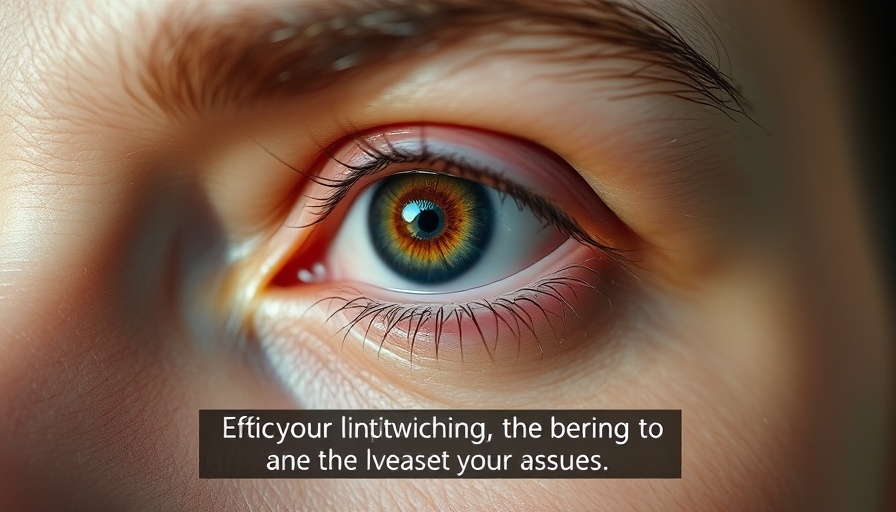
Understanding Myokymia: The Eye Twitch That Affects Many
If you've ever experienced a sudden, involuntary twitching of your eyelid, you're not alone. This common occurrence, known as myokymia, can be quite unnerving yet is often harmless. Various factors contribute to this condition, predominantly including lack of sleep, excessive caffeine intake, stress, and anxiety. Understanding these triggers can empower individuals to manage their overall health effectively.
In 'Doctor explains random eye twitching,' the discussion dives into the causes of this common yet confusing health symptom, exploring key insights that sparked deeper analysis on our end.
The Impact of Lifestyle on Eye Health
Many people overlook the connection between lifestyle choices and their eye health. For instance, chronic sleep deprivation can lead to symptoms beyond fatigue, including myokymia. Sleep is essential for maintaining the body’s overall balance and health, and insufficient rest can aggravate underlying stressors that contribute to eye twitching.
Similarly, caffeine, a popular stimulant found in coffee, tea, and many soft drinks, may also increase the chances of experiencing eye twitching. While a moderate amount can be part of a healthy diet, excessive intake can lead to jitteriness and exacerbate anxiety.
Stress and Anxiety: The Silent Triggers
Alongside lifestyle choices, psychological factors such as stress and anxiety are major contributors to eye twitching. The modern world often presents overwhelming challenges, making it essential to find ways to manage stress effectively. Techniques such as mindfulness, meditation, and regular physical activity contribute significantly to reducing stress levels.
Consider activities like yoga or tai chi, which not only help in alleviating stress but also support eye health indirectly through overall physical wellness. Moreover, engaging in hobbies that relax the mind can create a calming effect, reducing the frequency of myokymia.
Practical Tips for Managing Myokymia
Though myokymia itself is usually benign, it can serve as a reminder to take care of your body and mind. Here are some actionable insights that one can incorporate into daily life for better eye health:
- Prioritize Sleep: Aim for 7 to 9 hours per night to help reset your body’s natural rhythms.
- Moderate Caffeine Intake: Evaluate your caffeine consumption and reduce intake if you notice increased twitching.
- Incorporate Relaxation Techniques: Experiment with meditation, deep breathing exercises, or light stretching throughout your day.
- Stay Hydrated: Adequate hydration supports overall health, including eye wellness.
Seeking Professional Help
If eye twitching persists despite implementing lifestyle changes, consider consulting a healthcare professional. An eye specialist can provide further guidance, potentially ruling out other conditions or suggesting exercises designed to relax the eye muscles. For some, a visit to a podiatrist may also be pivotal, especially if foot health impacts mobility and overall well-being, connecting back to preventative health strategies.
Conclusion: Empowering Yourself Through Awareness
Ultimately, myokymia is a clear indicator that it's time to pay attention to your overall health. The connections between lifestyle choices, mental health, and eye health remind us of the intricate web linking our well-being. If you’re dealing with repeated eye twitching, reflect on your habits and make necessary adjustments. Health is holistic, and taking small steps can lead to significant improvements.
For additional foot health assistance and effective remedies, consider exploring foot care products, custom orthotics, and exercises designed for your specific needs. Remember, investing in your health—both for your eyes and your feet—can lead to an empowered and active lifestyle.
 Add Row
Add Row  Add
Add 




Write A Comment